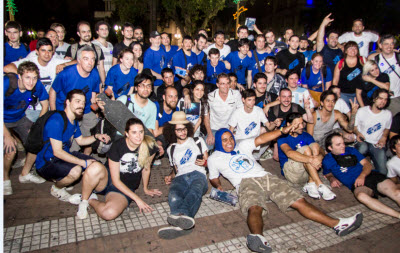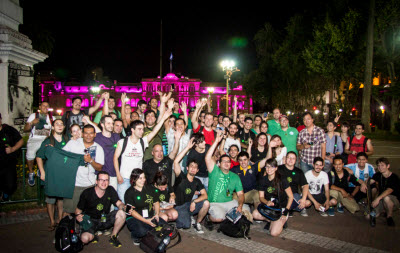Google’s Niantic Labs has formally launched its location-based game Ingress after a huge worldwide event series wrapped up over the weekend.
Ingress has been operational for more than a year and has more than a million downloads. But now it has formally exited beta testing and is available for download on Android mobile devices worldwide.
Augmented-reality games overlay a fictional virtual environment atop the real world, and Ingress is a step into a future where augmented reality is common and playable across wearable computing devices like Google Glass. Ingress links to real-world meetup events that are then reflected back in the game’s fiction.
Niantic Labs, a skunkworks division in San Francisco and Mountain View, Calif., created a game that pits two factions against each other, the Enlightened and the Resistance.
The team finished a 39-city, nine-week event series dubbed Operation #13MAGNUS on Saturday. The game had two events running simultaneously in San Francisco and Buenos Aires, with thousands of gamers turning out over the course of the day.
Hundreds of thousands of people followed the event’s progress online and participated in their local cities.
At the beginning of #13MAGNUS, Roland Jarvis, the self-declared ruler of the Enlightened Faction, was shattered into 13 pieces, or “Shards,” and scattered throughout the world. The challenge laid out for Agents was to reunite these Shards in San Francisco in order to resurrect Jarvis or to move them to Buenos Aires in order to destroy him forever. The Shards had to be moved across the globe by forming links between Portals, in-game locations that you can find in real-world locations.
Agents in more than 200 countries participated to claim the Shards and move them. The Enlightened faction won, resurrecting the game character Roland Jarvis, who appeared in downtown San Francisco, emerging from the Cupid’s Span Portal. Niantic will give participants a “founders medal” for getting involved in the event.
John Hanke, vice president in charge of Niantic Labs, told us in an earlier interview with GamesBeat, “Gaming and real-life meetups are really coming together. I can’t say we predicted how popular the live meetups would be.” He added, “We didn’t anticipate the degree to which people would go to live events to meet people they didn’t already know. The game is a social icebreaker.”
The sci-fi element comes in with the ability to pretend you’re in an alternate reality. You can act like a secret agent with a heads-up display (especially using Google Glass) where you can see virtual overlays on the real world. You can pick up items like shields, weapons, and power-ups and use them to capture or defend portals. Your aim is to take over as much territory as possible around the world. You can only do that through massive teamwork.
The meetups center on battles that take place at public monuments, which are portals between worlds in the sci-fi story behind the game.
In the game, one faction dubbed the Enlightened has identified portals to an alternate universe at public sculptures and wants to know more about what they might mean. But another faction dubbed the Resistance is wary of them, especially the “mind hacking” that happens around the locations.
The two sides battle with each other via smartphone screens as well as desktop computers. On the desktop, you can see a bird’s-eye view of the battle and communicate with the players in the streets. You’re like an operator in the control center, dispatching commands.
If you get near a Portal, you can hack it in order to take it over for your side and benefit from the energy concentrated around it. That energy has an influence on human minds and is a spark for creativity.
The autonomous Niantic Labs in Google’s San Francisco office created Ingress as well as teams in Los Angeles and Mountain View, Calif. It includes members of the teams that created Google Earth, Maps, and Street View. It’s one of the games that you can play using Google Glass, but it works on any Android smartphone.
The name Niantic refers to a whaling ship that docked in San Francisco Bay and became a hotel. It is now nothing but a historical landmark at the site of the iconic Transamerica Pyramid. The name Ingress refers to the entrance into our dimension.
The project is features the same “adventures on foot” theme that Google started with Hanke’s Field Trip app for Android. In that app, you receive notifications about places of historic interest on your smartphone as you pass by them. Hanke founded Keyhole, an Earth-visualization technology that Google bought and used as the basis for Google Earth.
Entertainment franchises like the television series Lost inspired Ingress. The project encourages movement, and it makes people strike up conversations with total strangers, who might or might not know about the game.
The title is free to play, and Niantic is experimenting with a sponsorship model.
VentureBeat's mission is to be a digital town square for technical decision-makers to gain knowledge about transformative enterprise technology and transact. Learn More



